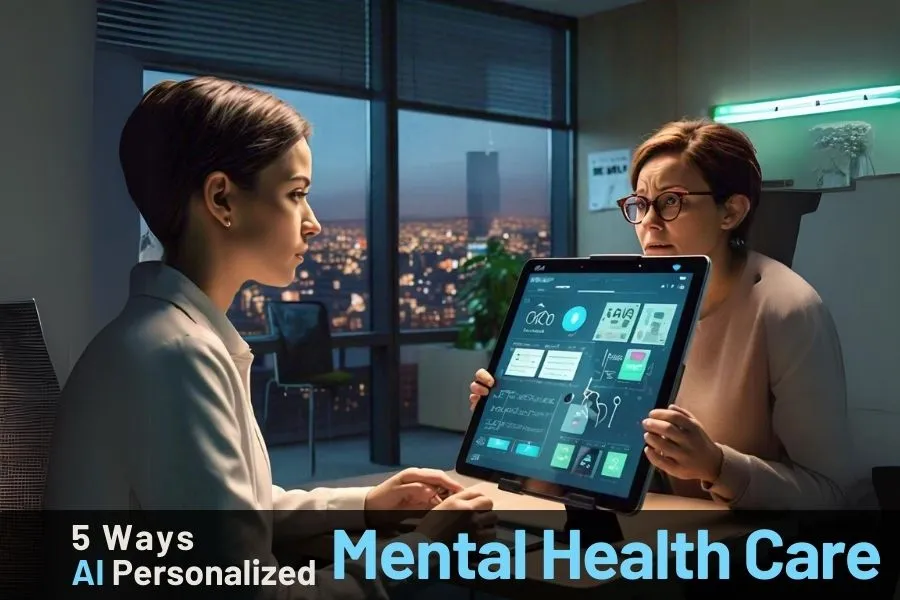Table of Contents
Introduction
In the rapidly evolving healthcare domain, artificial intelligence (AI) has surfaced as a revolutionary force, particularly within the sphere of mental health care. This article delves into the top five ways AI is revolutionizing and personalizing mental health care in 2024.
AI in Mental Health Care

AI has significantly impacted various sectors of healthcare, including mental health care. Understanding its potential and applications is crucial for grasping how it enhances patient outcomes and clinician efficiency.
Personalized Mental Health Care
The shift towards personalized mental health care emphasizes tailoring treatments to individual needs rather than adopting a one-size-fits-all approach. Traditional methods often fall short in addressing the unique challenges and complexities of mental health disorders.
Top 5 Ways AI Personalizes Mental Health Care
1. AI-driven Diagnostics
AI-powered tools analyze vast amounts of patient data, including genetic information, behavioral patterns, and environmental factors, to assist clinicians in accurate diagnoses. This data-driven approach enables early detection and intervention, leading to improved prognosis.
Cancer Detection: AI can analyze mammograms, X-rays, and other medical images to identify signs of cancer more accurately and efficiently than traditional methods. This can prompt prior judgments and better treatment results.
Disease Prediction: AI algorithms can analyze a patient’s medical history, genetic data, and lifestyle habits to predict their risk of developing certain diseases. This allows for preventive measures to be taken before symptoms even appear.
Personalized Medicine: AI can help tailor treatment plans to individual patients by considering their unique genetic makeup and medical history. This approach can prompt more compelling medicines with less aftereffects.
2. Customized Treatment Plans
By leveraging machine learning algorithms, AI systems create personalized treatment plans based on individual responses to therapies, medication efficacy, and lifestyle factors. This targeted approach enhances treatment outcomes while minimizing adverse effects.
Tool: Watson Oncology by IBM is a cloud-based cognitive computing platform specifically designed for oncology.
Function: Watson Oncology analyzes a patient’s medical history, genetic data, and tumor characteristics.
Application: By integrating with electronic health records, Watson Oncology can recommend treatment options tailored to the patient’s unique cancer profile. This might include identifying targeted therapies, predicting potential side effects, and suggesting clinical trials that match the patient’s specific needs.
3. Continuous Monitoring and Feedback
AI-enabled devices and applications offer real-time monitoring of patients’ mental health indicators, such as mood fluctuations, sleep patterns, and stress levels. This continuous feedback loop enables timely interventions and adjustments to treatment strategies.
Wearables with AI analysis: Smartwatches and fitness trackers can monitor sleep patterns, heart rate variability (linked to stress), and activity levels. AI algorithms can analyze this data and identify potential changes in mood or stress levels.
Speech analysis apps: Mobile apps can analyze conversation patterns or speech recordings to detect changes in tone, voice quality, or word choice that might indicate depression or anxiety.
4. Predictive Analytics for Early Intervention
AI algorithms analyze historical data to identify patterns indicative of mental health relapses or crisis situations. Predictive analytics empower healthcare providers to intervene proactively, preventing exacerbations and hospitalizations.
Mindstrong Health: Uses AI to analyze smartphone usage for changes indicating mental health issues.
Qntfy: Leverages AI and data from various sources to predict mental health risks and offer personalized interventions.
Woebot Health: Provides mental health support through AI chatbot, detecting mood shifts for early intervention.
5. Virtual Mental Health Assistants
AI-driven virtual assistants and chatbots provide accessible mental health support round-the-clock. These digital companions offer empathetic interactions, cognitive behavioral therapy (CBT) modules, and crisis intervention strategies, bridging gaps in traditional care models.
Woebot: An AI chatbot offering CBT techniques and personalized mental health support.
Wysa: An AI-powered chatbot providing mood tracking, mindfulness exercises, and CBT techniques.
Talkspace: Connects users with licensed therapists for online therapy sessions using AI-driven matching.
Future Trends

The future of AI in mental health care lies in seamless integration with telehealth services, enhancing remote access to quality care. However, ethical considerations regarding data privacy, algorithm biases, and human-AI collaboration remain pivotal areas for ongoing discourse and regulation.
Conclusion
AI’s transformative influence on personalized mental health care is undeniable, offering innovative solutions for early detection, tailored interventions, and accessible support. Embracing AI responsibly while prioritizing patient-centric care heralds a promising future for mental health wellness.
FAQs
1. Is AI replacing human therapists in mental health care?
AI complements rather than replaces human therapists, enhancing accessibility and efficiency.
2. How secure is AI-driven mental health data?
Robust data encryption and privacy protocols safeguard AI-driven mental health data.
3. Can AI tools be customized for specific mental health conditions?
Yes, AI algorithms can be tailored to address diverse mental health conditions and patient profiles.
4. Are AI therapy platforms effective for long-term mental health management?
Research indicates sustained benefits from AI therapy platforms, especially when integrated into comprehensive care plans.
5. What measures ensure ethical AI use in mental health care?
Transparent algorithms, informed consent, and ongoing ethical reviews are key safeguards for ethical AI use in mental health care.

